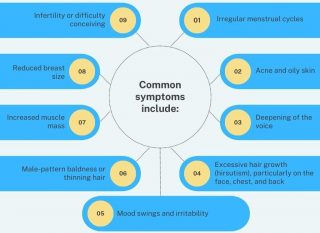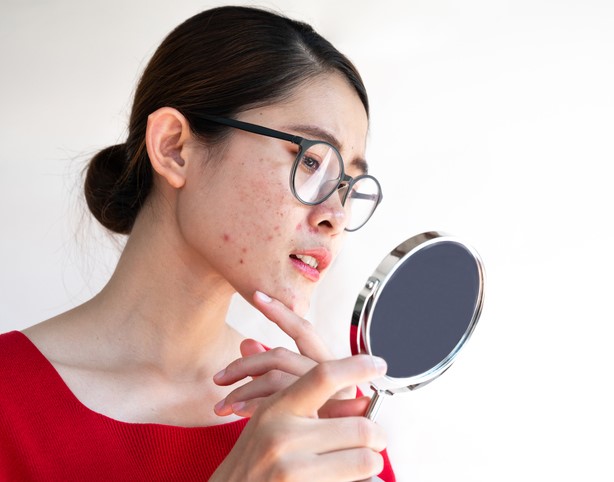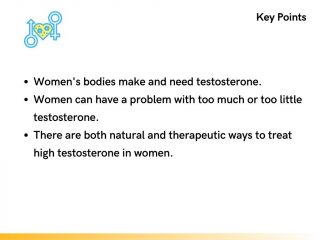Hormones like testosterone can be lower or higher than normal. Such hormone imbalances can occur in men or women. On these pages, we will take a close look at high testosterone in women, what causes it, and how to treat high testosterone in women.
A woman’s hormone levels are all about balance. Hormone imbalances with health consequences can occur if the level of a given hormone is either too low or too high. In women, this is particularly true of testosterone. While testosterone is a “male hormone,” women’s bodies make and need testosterone as well. In addition to problems with low testosterone, women can have a problem if their testosterone level is too high. When testosterone levels are above normal in a woman, it can cause symptoms that affect her physical appearance, such as increased hair growth or hair loss, acne, and decreased breast size. In more severe cases of testosterone imbalances in women, high testosterone can cause infertility and obesity.
Understanding High Testosterone in Women
Testosterone is a hormone primarily associated with male characteristics, but it is also present in smaller amounts in women. In some cases, women may experience elevated levels of testosterone, a condition known as high testosterone or hyperandrogenism. High testosterone in women can have various effects on their overall health and well-being.
Causes of High Testosterone in Women
There can be several causes of excessive testosterone production in women. Some of the most common causes of higher-than-normal testosterone levels in women are:
- Polycystic Ovary Syndrome – Polycystic Ovary Syndrome, or PCOS, is a common hormonal disorder that affects women of reproductive age. Some sources suggest that PCOS affects between 8 and 20 percent of women worldwide. Women are not usually diagnosed until they are in their 20s and 30s, but children as young as 11 years old can be affected. Other common complications of PCOS are infertility, miscarriage, type 2 diabetes, obesity, and endometrial cancer.
- Congenital Adrenal Hyperplasia (CAH) – CAH is the term given to a group of inherited disorders that affect the adrenal glands, leading to excessive production of androgens, including testosterone. Adrenal hyperplasia can result from enzyme deficiencies that disrupt the normal synthesis of cortisol and aldosterone hormones.
- Tumors – Rarely, tumors in the ovaries or adrenal glands can cause overproduction of testosterone. These tumors are typically noncancerous and can be surgically removed.
- Medications – Certain medications, such as anabolic steroids, corticosteroids, and some hormonal contraceptives, may contribute to elevated testosterone levels in women.
Symptoms of High Testosterone Levels in Women
The symptoms of high testosterone in women can vary depending on the underlying cause and individual factors. Common symptoms include:

Natural Ways to Treat High Testosterone in Females
Depending on the severity of high testosterone in a woman, it is often quite possible to bring it down into the normal ranges with a natural solution. Testosterone levels can be lowered in women by making certain dietary and lifestyle changes.
Dietary Adjustments to Decrease Testosterone Levels
A healthy balanced diet can help better balance all of a woman’s hormones, including testosterone. Women should go for a well-balanced diet that includes adequate amounts of protein, healthy fats, and complex carbohydrates. This helps regulate insulin levels, as insulin resistance can contribute to high testosterone levels. Focus on whole grains, lean proteins, fruits, vegetables, and healthy fats like avocados and nuts. b. Phytoestrogen-Rich
Regular Exercise and Weight Management
The other way to manage weight and combat insulin resistance and other issues related to high testosterone in women is regular exercise. Engaging in regular aerobic exercises like jogging, cycling, or swimming can help reduce insulin resistance, improve metabolic function, and regulate hormone levels. b. Resistance Training: Incorporating strength training exercises can help increase muscle mass, which promotes better insulin sensitivity and hormone balance.
Stress Management Techniques
Practice stress management techniques such as mindfulness, deep breathing exercises, or engaging in hobbies to reduce stress levels and promote hormonal balance. Seek emotional support from friends, family, or support groups to help manage stress and maintain overall well-being.
Herbal Remedies and Supplements
Some herbs and supplements could prove beneficial in managing testosterone levels in women. Drinking spearmint tea daily has shown promise in reducing androgen levels, including testosterone. It is believed to have anti-androgenic properties. Saw Palmetto is a herb known for its anti-androgenic effects and may help lower testosterone levels in women with high levels.
Seeking Medical Guidance
If you have been experiencing the symptoms mentioned above that could indicate high testosterone in women and you have tried the aforementioned natural ways to lower testosterone in women, it may be time to seek medical guidance and explore therapeutic treatment options.
Medical Treatments for High Testosterone Levels in Women
When the natural methods of bringing down testosterone levels in women have failed to lower testosterone into the normal ranges, medical interventions may be necessary. Medical treatments for low testosterone in women include the following:
- Oral Contraceptives – Certain hormonal contraceptives, such as combined birth control pills or progestin-only pills, can help regulate hormone levels and alleviate symptoms related to high testosterone in women.
- Anti-Androgen Medications – These medications block the effects of androgens, including testosterone, and can be prescribed to manage symptoms like hirsutism and acne. Spironolactone and flutamide are commonly used anti-androgens.
- Insulin-Sensitizing Medications – Women with PCOS who have insulin resistance may benefit from medications like metformin, which can help improve insulin sensitivity and regulate hormone levels.
- Ovarian Drilling – In cases of PCOS where medication and lifestyle changes have been ineffective, a surgical procedure called ovarian drilling may be recommended. It involves using heat or a laser to destroy a portion of the ovary, reducing testosterone production.
Regular Monitoring and Follow-up
If you are a woman who has been diagnosed with high testosterone, regular monitoring and follow-up are important to maintain control over the condition. Your doctor will let you know how often you need to have your levels checked depending on the cause of your elevated testosterone and your treatment protocols, but most likely, you will need to have your testosterone levels checked every three months during your first year of treatment.
Conclusions
High testosterone in women can lead to a range of symptoms that can impact physical appearance, emotional well-being, and fertility. Understanding the underlying causes and available treatment options is essential for managing this condition effectively. Consultation with a healthcare professional is crucial to determine the appropriate treatment plan based on individual circumstances and medical history.


